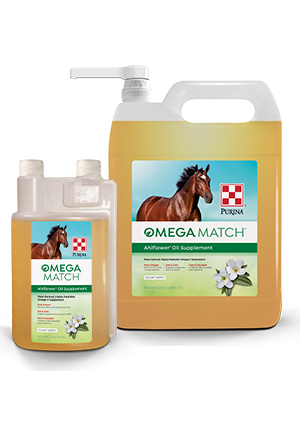
Six Common Horse Feed Additives
Nutrition : Ingredients & Nutrients

As a horse owner, everywhere you turn, there seems to be a new supplement, feed or feed additive accompanied by claims providing a variety of extraordinary benefits for your horse.
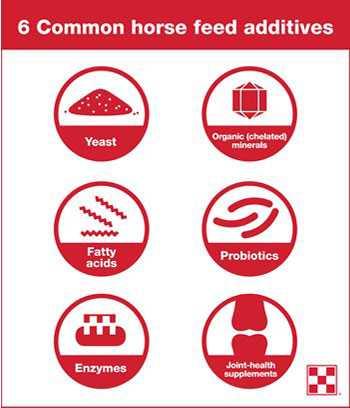
With so many options, it can be challenging to tell which claims are based in real science and which are simply sales pitches.
At Purina, we are constantly looking for new ways to deliver optimal nutrition to horses. We continue reviewing and conducting research, investigating feed additives and their effects on nutrition and performance in horses, and formulating feeds accordingly.
We’ve compiled six of the most common feed additives and explained the science behind them.1.
Definition: The Association of American Feed Control Officials (AAFCO) defines several yeast products as feed ingredients, including dried yeast, yeast culture and yeast extract.
The Purina Equine Research Team completed a long-term study looking at the potential effect of yeast on enhancing fiber digestion in horses. The data indicated no positive effects of yeast on fiber digestion.
However, a separate study conducted in aging horses found ActivAge®, a proprietary yeast-derived prebiotic, to support the aging immune system. ActivAge® is a unique yeast fermentate derived from a multi-stage process. This process produces beneficial metabolites containing vitamins, minerals, amino acids and antioxidants that work together to support immune function in senior horses.
A third study looking at the effects of a different specialized yeast extract that works by directly priming immune cells showed supplementation supported immune response during a challenge. This can be especially important for stressed horses who may already have suppressed immune function.
Ongoing Purina research continues to investigate potential effects on other parameters of equine digestion, health and performance. Only when beneficial effects in horses are confirmed in controlled, horse-specific studies will Purina add yeast-derived feed ingredients to additional horse feed formulations.
Definition: Mineral ions attached to proteins, specific amino acids or other organic molecules. Currently, the only forms of chelated minerals widely available are copper, zinc, cobalt, manganese and selenium.
The science: Per the 2007 NRC: “Collectively, all studies comparing organic to inorganic sources of trace minerals suggested minimal to no difference in biologic utilization or animal performance, consistent with results from swine studies. In fact, some studies reported improved responses to inorganic compared to organic mineral sources.”
The Purina Equine Research Team has studied the use of organic minerals at rates of up to 100% inclusion in the formula and, to date, no benefit of organic over inorganic mineral supplementation has been shown.3.
Definition: All fats and oils are composed of combinations of various fatty acids.
Equine diets do not normally have an overabundance of LA, and forages contain more than three times the amount of ALA as LA. As such, horses naturally consume relatively higher levels of omega-3 fatty acids and lower levels of omega-6’s.
The optimal amounts and ratio of omega-6 to omega-3 fatty acids for horses have yet to be determined through research. The NRC states there have been no reports of an ALA or LA deficiency in horses and only provides a suggested minimum dietary intake level for LA (omega-6), but not ALA (omega-3).
Definition: Direct-fed microbials (DFM), or probiotics, are products intended to deliver live colonies of various bacteria to the digestive tracts of healthy animals. Ideally, the bacteria colonize the digestive tract of the animal and hopefully improve health and digestion.
The science: In research studies, little benefit has been demonstrated in horses fed different individual or populations of DFM.
In fact, a study by Weese and Rousseau (2005), clinical disease and diarrhea were induced in neonatal foals fed a specific DFM. According to the NRC, “concerns about safety and utility and limited number of clinical studies in horses require further evaluation of probiotic products.”5.
Definition: Enzymes, including cellulases, hemicellulases, carbohydrases and proteases, are added to animal feeds to attempt an improvement in digestion and absorption of specific nutrients in the animal’s digestive tract. In the horse, phytase and cell wall carbohydrate enzymes are postulated to improve net availability of dietary phosphorus and fiber.
The science: Currently, research has not proven equivocal benefits of dietary digestive enzymes added to diets for horses. Per the NRC, “further research is required to adequately assess applicability of enzymes to facilitate nutrient availability from the equine diet.”6.
Definition: Products containing glucosamine, chondroitin sulfate, a combination of the two and possibly manganese ascorbate; compounds perceived as “chondroprotective,” meaning they supply “building blocks” to help delay, stabilize or repair osteoarthritis lesions.
The science: Research has not conclusively proven OJHS effective in providing protection against developing joint inflammation, or whether they can reduce pain or delay the progression of existing osteoarthritis.
The cost of adding a quality OJHS ingredient in an amount providing a recommended dose in a feed is extremely expensive. To offer the best opportunity for an OJHS to help a horse, use a well-established product from a reputable company with trusted quality control measures and meaningful clinical trials behind the product.
Follow directions and feed for two to three months, closely observing the horse for improvement in range of motion and comfort level. If improvements are evident, continue using the product. As always, consult with a veterinarian to help determine how to best manage joint health in horses.
Every horse is unique and so is their nutrition. Finding the right horse feeding program is paramount to helping your horse perform and feel the best. Find the right feed for your horse with our Feed Finder Tool.
1 The National Research Council’s publication Nutrient Requirements of Horses, 6th Revised Edition (the “NRC”), published in 2007, is the most comprehensive collection of scientific nutrition research conducted in horses. It features a detailed review of the available scientific literature and is universally considered as the definitive reference for equine nutrient requirements in the United States.

With so many options, it can be challenging to tell which claims are based in real science and which are simply sales pitches.
At Purina, we are constantly looking for new ways to deliver optimal nutrition to horses. We continue reviewing and conducting research, investigating feed additives and their effects on nutrition and performance in horses, and formulating feeds accordingly.
We’ve compiled six of the most common feed additives and explained the science behind them.
1. 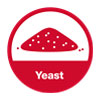 Yeast products
Yeast products
Definition: The Association of American Feed Control Officials (AAFCO) defines several yeast products as feed ingredients, including dried yeast, yeast culture and yeast extract.
- Dried yeast may be either active (Active Dry Yeast) or non-fermentative (Primary Dried Yeast or Dried Yeast).
- Yeast culture is a dried product composed of viable yeast cells and the media on which it was grown.
- Yeast extract is a dried or concentrated product of cell contents from ruptured yeast cells.
The Purina Equine Research Team completed a long-term study looking at the potential effect of yeast on enhancing fiber digestion in horses. The data indicated no positive effects of yeast on fiber digestion.
However, a separate study conducted in aging horses found ActivAge®, a proprietary yeast-derived prebiotic, to support the aging immune system. ActivAge® is a unique yeast fermentate derived from a multi-stage process. This process produces beneficial metabolites containing vitamins, minerals, amino acids and antioxidants that work together to support immune function in senior horses.
A third study looking at the effects of a different specialized yeast extract that works by directly priming immune cells showed supplementation supported immune response during a challenge. This can be especially important for stressed horses who may already have suppressed immune function.
Does Purina horse feed include yeast products?
Purina currently includes the yeast-derived prebiotic ActivAge® in Equine Senior® and Equine Senior Active® horse feeds to further support horses during the aging process. In addition, Purina includes a proprietary specialized yeast extract in Ultium Gastric Care, to provide high performance horses additional immune support during times of stress.Ongoing Purina research continues to investigate potential effects on other parameters of equine digestion, health and performance. Only when beneficial effects in horses are confirmed in controlled, horse-specific studies will Purina add yeast-derived feed ingredients to additional horse feed formulations.
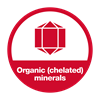 2. Organic (chelated) trace minerals
2. Organic (chelated) trace minerals
Definition: Mineral ions attached to proteins, specific amino acids or other organic molecules. Currently, the only forms of chelated minerals widely available are copper, zinc, cobalt, manganese and selenium.The science: Per the 2007 NRC: “Collectively, all studies comparing organic to inorganic sources of trace minerals suggested minimal to no difference in biologic utilization or animal performance, consistent with results from swine studies. In fact, some studies reported improved responses to inorganic compared to organic mineral sources.”
The Purina Equine Research Team has studied the use of organic minerals at rates of up to 100% inclusion in the formula and, to date, no benefit of organic over inorganic mineral supplementation has been shown.
Does Purina horse feed include organic (chelated) trace minerals?
With the lack of research evidence clearly demonstrating a benefit of using organic trace minerals over inorganic, Purina does not currently include organic trace minerals in horse feed. If an organic mineral does demonstrate a benefit to horses in the future, Purina will consider adding the ingredient to horse feed formulations.3. 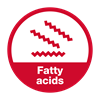 Omega-3 and Omega-6 fatty acids
Omega-3 and Omega-6 fatty acids
Definition: All fats and oils are composed of combinations of various fatty acids.
- Linoleic acid (LA) is an essential omega-6 fatty acid
- Alpha-linolenic acid (ALA) is an essential omega-3 fatty acid,
- Both must be provided in the diet and cannot be constructed within the body.
Equine diets do not normally have an overabundance of LA, and forages contain more than three times the amount of ALA as LA. As such, horses naturally consume relatively higher levels of omega-3 fatty acids and lower levels of omega-6’s.
The optimal amounts and ratio of omega-6 to omega-3 fatty acids for horses have yet to be determined through research. The NRC states there have been no reports of an ALA or LA deficiency in horses and only provides a suggested minimum dietary intake level for LA (omega-6), but not ALA (omega-3).
Does Purina horse feed include omega-3 fatty acids?
Purina horse feeds contain several ingredients considered to be good sources of omega-3 fatty acids, including flax seed, rice bran and soy oil. Forages are also an excellent source of omega-3 fatty acids. Adding additional sources of omega-3 fatty acids, such as fish oil, is a hopeful but unproven effort to improve the health and wellbeing of the horse.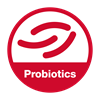 4. Direct-fed microbials (probiotics)
4. Direct-fed microbials (probiotics)
Definition: Direct-fed microbials (DFM), or probiotics, are products intended to deliver live colonies of various bacteria to the digestive tracts of healthy animals. Ideally, the bacteria colonize the digestive tract of the animal and hopefully improve health and digestion.The science: In research studies, little benefit has been demonstrated in horses fed different individual or populations of DFM.
In fact, a study by Weese and Rousseau (2005), clinical disease and diarrhea were induced in neonatal foals fed a specific DFM. According to the NRC, “concerns about safety and utility and limited number of clinical studies in horses require further evaluation of probiotic products.”
Does Purina horse feed include probiotics?
Purina horse feeds do not currently include probiotics. Purina has investigated and conducted controlled research on the use of DFM in horses. Thus far, we have been unable to identify optimal supplementation levels or any efficacious product providing obvious benefits to the horse.5. 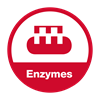 Digestive enzymes
Digestive enzymes
Definition: Enzymes, including cellulases, hemicellulases, carbohydrases and proteases, are added to animal feeds to attempt an improvement in digestion and absorption of specific nutrients in the animal’s digestive tract. In the horse, phytase and cell wall carbohydrate enzymes are postulated to improve net availability of dietary phosphorus and fiber.The science: Currently, research has not proven equivocal benefits of dietary digestive enzymes added to diets for horses. Per the NRC, “further research is required to adequately assess applicability of enzymes to facilitate nutrient availability from the equine diet.”
Does Purina horse feed include digestive enzymes?
Purina horse feeds do not include digestive enzymes. Per current research, there are no proven benefits of dietary digestive enzymes added to diets for horses.6. 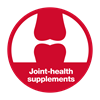 Oral joint-health supplements (OJHS)
Oral joint-health supplements (OJHS)
Definition: Products containing glucosamine, chondroitin sulfate, a combination of the two and possibly manganese ascorbate; compounds perceived as “chondroprotective,” meaning they supply “building blocks” to help delay, stabilize or repair osteoarthritis lesions.The science: Research has not conclusively proven OJHS effective in providing protection against developing joint inflammation, or whether they can reduce pain or delay the progression of existing osteoarthritis.
Does Purina horse feed include OJHS?
Purina horse feeds do not include OJHS. Glucosamine and chondroitin sulfate are not approved horse feed ingredients in all states. In addition, concentrate feeding rates are highly variable between horses, even those of the same body weight. Horses eating different amounts of feed would eat different doses of OJHS and may not receive the recommended amounts to achieve desired results.The cost of adding a quality OJHS ingredient in an amount providing a recommended dose in a feed is extremely expensive. To offer the best opportunity for an OJHS to help a horse, use a well-established product from a reputable company with trusted quality control measures and meaningful clinical trials behind the product.
Follow directions and feed for two to three months, closely observing the horse for improvement in range of motion and comfort level. If improvements are evident, continue using the product. As always, consult with a veterinarian to help determine how to best manage joint health in horses.
Every horse is unique and so is their nutrition. Finding the right horse feeding program is paramount to helping your horse perform and feel the best. Find the right feed for your horse with our Feed Finder Tool.
1 The National Research Council’s publication Nutrient Requirements of Horses, 6th Revised Edition (the “NRC”), published in 2007, is the most comprehensive collection of scientific nutrition research conducted in horses. It features a detailed review of the available scientific literature and is universally considered as the definitive reference for equine nutrient requirements in the United States.

